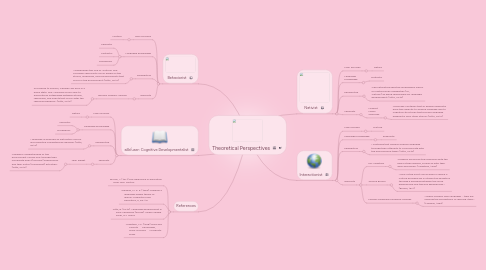
1. Behaviorist
1.1. Main Focuses
1.1.1. Nurture
1.2. Language Knowledge
1.2.1. Semantic
1.2.2. Syntactic
1.2.3. Morpehmic
1.3. Perspective
1.3.1. " emphasizes the role of “nurture” and considers learning to occur based on the stimuli, responses, and reinforcements that occur in the environment" (Otto, 2010)
1.4. Theorists
1.4.1. Burrhus Frederic Skinner
1.4.1.1. According to Skinner, Children are born in a blank state and " learning occurs due to associations established between stimuli, responses, and events that occur after the response behavior" (Otto, 2010)
2. Nativist
2.1. Main Focuses
2.1.1. Nature
2.2. Language Knowledge
2.2.1. Syntactic
2.3. Perspective
2.3.1. "The nativist perspective emphasizes inborn or innate human capabilities (i.e., “nature”) as being responsible for language development" (Otto, 2010)
2.4. Theorists
2.4.1. Linguist Noam Chomsky
2.4.1.1. "Chomsky contends that all people inherently have the capacity to acquire language due to cognitive structures that process language differently from other stimuli" (Otto, 2010)
3. Interactionist
3.1. Main focuses
3.1.1. Nurture
3.2. Language Knowledge
3.2.1. Pragmatic
3.3. Perspective
3.3.1. " contends that children acquire language through their attempts to communicate with the world around them" (Otto, 2010)
3.4. Theorists
3.4.1. Lev Vygotsky
3.4.1.1. "Children solve practical problems with the help of their speech, as well as with their eyes and hands" (Vygotksy, 1978)
3.4.2. Jerome Bruner
3.4.2.1. ""One of the most crucial ways in which a culture provides aid in intellectual growth is through a dialogue between the more experienced and the less experienced." (Bruner, 1971)
3.4.3. Michael Alexander Kirkwood Halliday
3.4.3.1. ""When children learn language … they are learning the foundations of learning itself." (Halliday, 1993)
4. Cognitive Developmentalist
4.1. Main Focuses
4.1.1. Nature
4.2. Language Knowledge
4.2.1. Semantic
4.2.2. Morphemic
4.3. Perspective
4.3.1. " language is acquired as maturation occurs and cognitive competencies develop" (Otto, 2010)
4.4. Theorists
4.4.1. Jean Piaget
4.4.1.1. "children’s understanding of the environment comes only through their immediate direct (sensory) experiences and their motor (movement) activities" (Otto, 2010)
